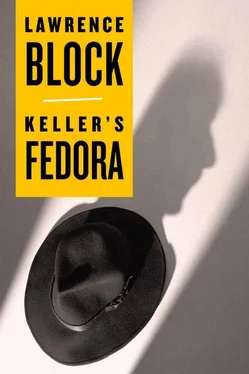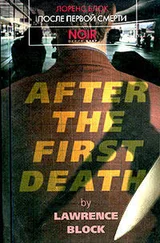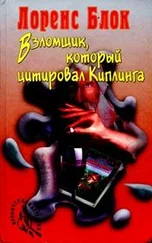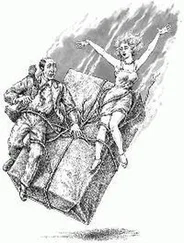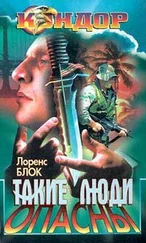Лоуренс Блок - Keller’s Fedora
Здесь есть возможность читать онлайн «Лоуренс Блок - Keller’s Fedora» весь текст электронной книги совершенно бесплатно (целиком полную версию без сокращений). В некоторых случаях можно слушать аудио, скачать через торрент в формате fb2 и присутствует краткое содержание. Год выпуска: 2016, Издательство: LB Productions, Жанр: Криминальный детектив, на английском языке. Описание произведения, (предисловие) а так же отзывы посетителей доступны на портале библиотеки ЛибКат.
- Название:Keller’s Fedora
- Автор:
- Издательство:LB Productions
- Жанр:
- Год:2016
- ISBN:нет данных
- Рейтинг книги:3 / 5. Голосов: 1
-
Избранное:Добавить в избранное
- Отзывы:
-
Ваша оценка:
- 60
- 1
- 2
- 3
- 4
- 5
Keller’s Fedora: краткое содержание, описание и аннотация
Предлагаем к чтению аннотацию, описание, краткое содержание или предисловие (зависит от того, что написал сам автор книги «Keller’s Fedora»). Если вы не нашли необходимую информацию о книге — напишите в комментариях, мы постараемся отыскать её.
Keller’s Fedora — читать онлайн бесплатно полную книгу (весь текст) целиком
Ниже представлен текст книги, разбитый по страницам. Система сохранения места последней прочитанной страницы, позволяет с удобством читать онлайн бесплатно книгу «Keller’s Fedora», без необходимости каждый раз заново искать на чём Вы остановились. Поставьте закладку, и сможете в любой момент перейти на страницу, на которой закончили чтение.
Интервал:
Закладка:
But he knew he had to eat, and wound up in a booth at Denny’s, further confounded by the array of choices. He picked their Hungry Man’s Breakfast, which struck him as curious, given that he didn’t feel hungry and nobody but Denny thought it was time for breakfast. The waitress brought him a huge plate of food, and he surprised himself by eating all of it.
Back in his room, he did the mental exercises that always followed a job. Pictured the Marlboro Man as he’d last seen him, slumped over the steering wheel. And then went to work on that picture in the Photoshop of his mind, shrinking it, leaching the color out of it, then working on the tiny black-and-white image he’d made of it, fading it all to gray, shrinking it further until it was a dot, a pinpoint.
He’d taught himself this technique years ago, and for the most part it had proven effective. It wasn’t something you did just once, you had to repeat it, but eventually it was difficult to summon up the original image because you really had changed the look of it in your memory.
This time around it was a little hard to get started, because the only image he had to work with didn’t start out with much in the way of color or detail. It had been dark by then, and while there were lights in the parking lot, the trio of white vans had been parked well away from them. You’d think it would be easier to blur and shrink and fade an image that wasn’t all that vivid to begin with, but for some reason it wasn’t.
Well, he did what he could.
And slept well enough, although he awoke with a sense of having been troubled by dreams. He couldn’t recall a dream, couldn’t even say for certain that he’d been dreaming, but he got out of bed feeling less rested than untroubled sleep should have left him.
He checked out, skipped breakfast, and drove back to O’Hare to return the car. While he was there, he checked the board and saw that United had a flight to Louis Armstrong Airport scheduled to depart at 11:45.
No. Stick with the plan.
He took a cab to the train station, picked up the ticket he’d reserved, and checked his bag. He walked around until he found a place to have coffee, got a croissant while he was at it, and took out his phone. The Pablo phone was in his bag, along with the burner he’d bought and never used, but he was in Chicago now, not Baker’s Bluff, and he was Nicholas Edwards once again instead of James J. Miller, so it didn’t matter if his iPhone pinged off towers left and right.
He powered it up and called home, and Julia answered.
“I’m in Chicago,” he told her. “My train leaves around eight and gets in at three-thirty tomorrow afternoon.”
“And everything’s taken care of?”
“All wrapped up. I thought it would take longer, but it went well.”
“I bet it was the hat. I hope you’ve still got it.”
He lifted a hand, touched the brim to make sure. “I’m wearing it now.”
‘Well, be careful,” she said. “You’re in the Windy City.”
“That’s true.”
“Although I read somewhere that they call it that because the local politicians are such windbags, but I don’t know if I believe it. If that’s how it worked, wouldn’t every city be the Windy City?”
He walked around, looked at things, did a little shopping. Ate a meal, saw a movie. They had a lounge in Union Station for first — class passengers, and that’s what you became when you booked a roomette. He was in the lounge by 6:30, drinking coffee and watching CNN until they called his train for boarding.
“Good evening, Mr. Edwards. Good to see you again, sir.”
It was nice to have the same porter, nicer still that he happened to remember the man’s name. “Ainslie,” he said, and was rewarded with a smile, while Ainslie was in turn rewarded as before with a twenty-dollar bill.
The dining car wouldn’t be serving until breakfast, Ainslie told him, but there’d be coffee and sandwiches in the café car as soon as they got underway. Keller looked out the window for a while, went and had something to eat, and got back to his roomette in time to have Ainslie make up the bed. He lay in the dark for a long time, while the train sped up and slowed down, passing through stations. The last one he was aware of was Centralia, sometime after midnight.
He slept all right, surfacing every couple of hours but lulled back to sleep each time by the motion of the train. After breakfast he called home, but rang off when the call went to voice mail. He was only about a third of the way into Jake Dagger’s story, and he’d have returned to it if it hadn’t been in his checked bag.
The roomette was supplied with the current issue of Amtrak’s magazine, and he read an article proclaiming Richmond, Virginia, as a hot destination for foodies. Keller, a longtime New Yorker now living in New Orleans, was somehow skeptical. He tried to imagine a couple of Tribeca sophisticates, say, or their Vieux Carré equivalents, packing for a weekend of gourmet excess in Richmond. “We’ll take the train, darling! Oh, I can hardly wait to dig into that organic kale!”
But what did he know?
He tried Julia again, rang off when he got a busy signal. Then it was time for lunch, and he had his second meal in the dining car, and called her from his table while he finished his coffee. “Just a couple of hours,” he said, and she told him she’d pick him up at the station, but to call her if the train was going to be late. It was on time so far, he said.
“I did a little shopping in Chicago,” he added. “I bought Jenny a present.”
“Who’d have guessed? You know what I’ll do? I’ll pick her up from school on my way to the station. That might get me there closer to four than three-thirty.”
“That’s probably better anyway. I checked my bag, and that means waiting until it makes it to Baggage Claim.”
“Oh,” she said.
“Oh?”
“Your phone is in your bag.”
“No, darling,” he said patiently. “It’s in my hand. Otherwise we wouldn’t be having this conversation.”
“The other phone.”
“Uh—”
“Dot called a couple of hours ago. She said she couldn’t get through to you, and I said reception could be iffy on trains. She said she’d try again. But if your phone’s in your checked luggage—”
“I could call her,” he said. “On this phone. But if it’s important enough to call her—”
“Then it’s important enough to do it on the right phone.”
“I’d say so, yes.”
“Well, I’ll see you in a few hours.”
He ended the call, pocketed the phone, and tried to figure out a way that Dot’s call could be nothing to worry about. If the client was happy, if he’d sent the rest of the money, she might call him to tell him so. But, failing to reach him, would she call Julia?
No, she wouldn’t. So that wasn’t it.
While anything might have led her to pick up the Pablo phone, even a simple desire to congratulate him further on a job well done, the second call meant trouble. It indicated not merely that she’d been unable to reach him but that she’d needed to reach him, and that wouldn’t have been to offer congratulations, or to pass the time of day. Something had gone wrong.
And he’d have to wait to find out what it was. Well, that was okay. He was good at waiting. And this time at least he wouldn’t need a wide-mouthed jar.
“The good news,” Dot said, “is that he thinks you did a hell of a job. In that respect he couldn’t be happier.”
“What’s the other respect?”
“I’ll get to that, Pablo. First let’s look on the bright side, okay?”
The bright side, he thought, was less of a pleasure to look at when you knew the dark side was coming. Still, he focused on it. He was home with his wife and daughter, both of whom seemed happy with what he’d brought them from Chicago. He’d done his work quickly and efficiently, and to the evident satisfaction of his employer. And now he was in his stamp room, talking on a safe phone with his best friend of many years standing. If there was bad news to come, he figured he could handle it.
Читать дальшеИнтервал:
Закладка:
Похожие книги на «Keller’s Fedora»
Представляем Вашему вниманию похожие книги на «Keller’s Fedora» списком для выбора. Мы отобрали схожую по названию и смыслу литературу в надежде предоставить читателям больше вариантов отыскать новые, интересные, ещё непрочитанные произведения.
Обсуждение, отзывы о книге «Keller’s Fedora» и просто собственные мнения читателей. Оставьте ваши комментарии, напишите, что Вы думаете о произведении, его смысле или главных героях. Укажите что конкретно понравилось, а что нет, и почему Вы так считаете.
